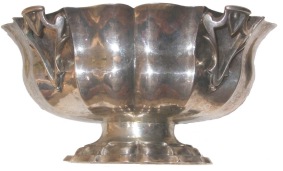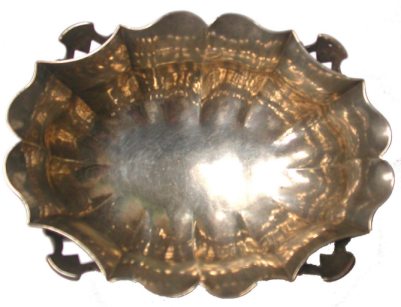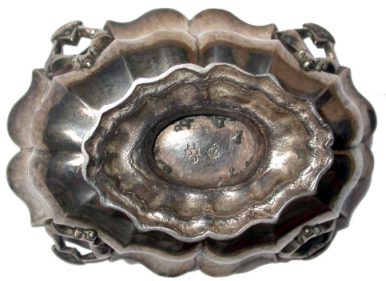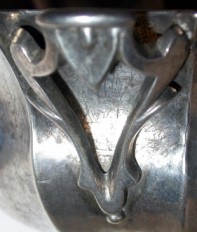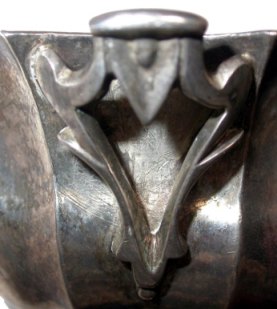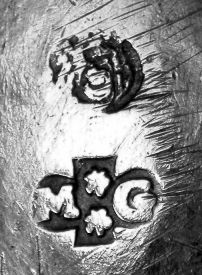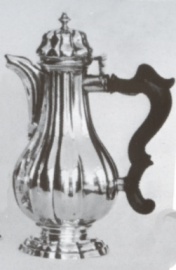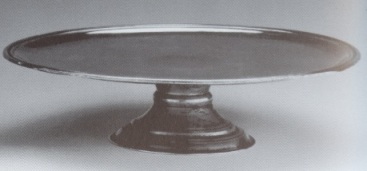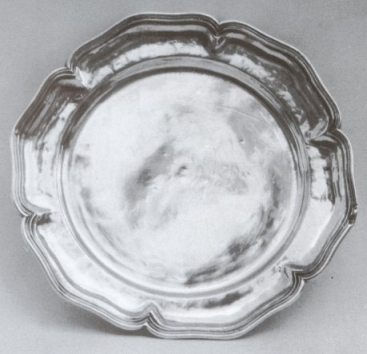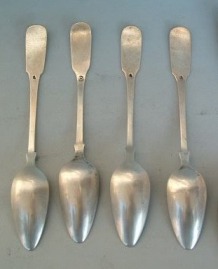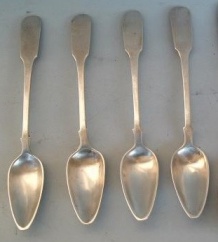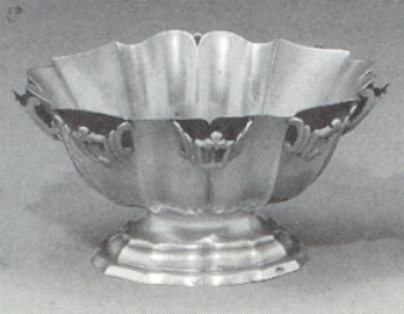click on images to enlarge
A SUGAR BOWL WITH ST. MARK'S LION
Fred Sinfield writes:
The opportunity to purchase a reasonably sized piece of antique
silver at a leading auction house's general goods auction is rare.
As their rooms are nearby it is a good excuse to walk the dog and see if
anything of interest is coming up. One item caught my eye so upon
returning home out with the reference books to try to trace the maker –
but to no avail.
Acquired the piece as I had expected competition but I was the only one
willing to take the chance that it was identifiable. With the bowl and a
pile of auction catalogues, the long process of thumbing through these
eventually proved successful.
Had to go back to a Sotheby's New York “Sale of Important English and
Continental Silver.” of 19th April 1991. The illustrated description of
Lot 42 and the bowl next to me was very similar to “An Important Silver
Oval Sugar Bowl, North Italian, Third Quarter 18th Century, Probably
Modena, of lobed and fluted oval form, the rim applied with eight cast
openwork cartouche-shaped spoon holders, conforming pedestal foot,
marked on the base rim with an eagle an a ? a lion holding a shield,
10ozs, length 16.5cm.” that realised $1650+.
The main differences between the two bowls being four spoon holders,
13.5cms and weighing 225grams.
The maker “MG' was traced to Mark 821 in “I Marchi dell'Argenteria
Italiana.”
The other mark on the base is probably the Town Mark of Venice as
illustrated in Marc Rosenberg “Der Goldschmiede Merkzeichen. VI Band.”
Mark 7485.
Fred Sinfield.
Sotheby's New York, 19th April 1991
Important Oval Sugar Bowl, North Italian, Third Quarter 18th Century
silver sugar bowl with four spoon holders
sugar bowl marks
The idea of Fred Sinfield is correct. The silver sugar bowl was made
in Venice in the second half of 18th century.
The 'lion' is the mark of the ancient Repubblica di Venezia (Republic of
Venice - Italy) and represents a winged lion's head holding a Gospel.
'The lion' is the emblem on Venice flag representing the symbol of its
Patron, St. Mark Evangelist, It holds a Gospel (not a shield) with a
latin inscription PAX TIBI MARCE EVANGELISTA MEUS (Peace to Mark, My
Evangelist).
various shapes of 'bollo di San Marco' (Republic of Venice mark)
from 14th to 18th century
The mark M G isn't a maker mark but the assayer mark ('Toccador'
or 'Sazador in Zecca'). There are many silver pieces with this mark
(coffee pots, trays, sugar bowls, salvers on foot) but the assayer is
unidentified.
coffee pot, salver on foot, dish: all with MG and two stars mark
Usually these sugar bowls were coupled to spoons with a shape very
similar to English 'fiddle thread' and this style was widely used in
Venice well on 19th century.
Below there are the photos of four Venetian spoons of the beginning of
19th century belonging to my private collection
(www.silvercollection.it)
silvers spoon: Venice, beginning of 19th century
Fred Sinfield - Giorgio Busetto - 2004 -
|
